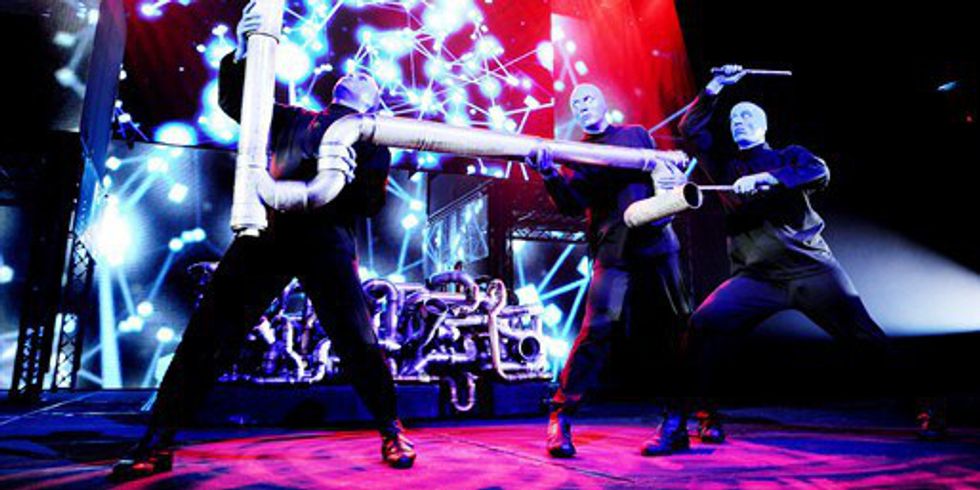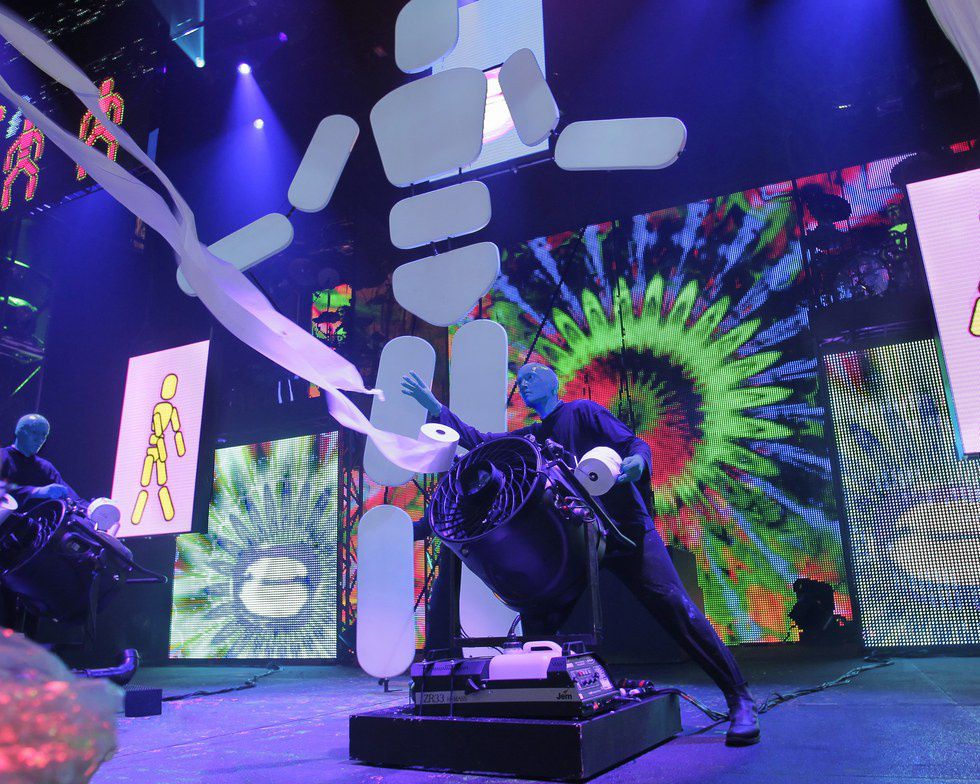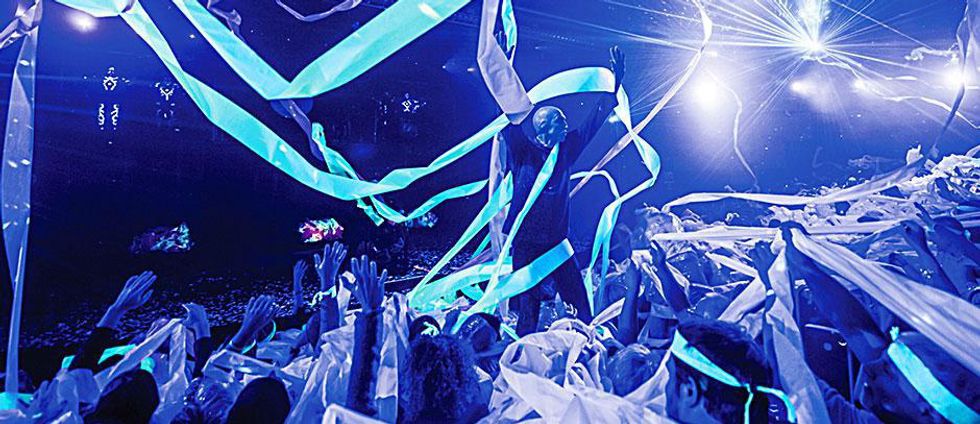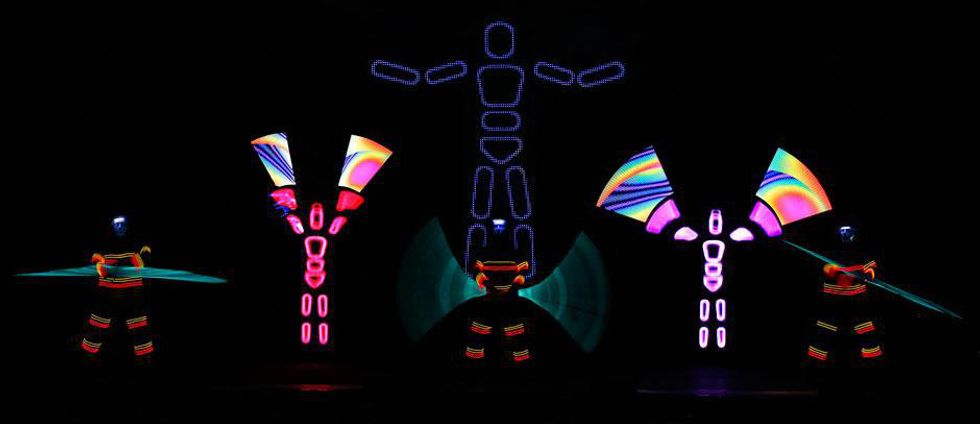If you have ever attended a Blue Man Group performance, you know what I’m thinking right about now. It’s that show you love, but can’t exactly explain. The loudness, the bright lighting, all that toilet paper, the gallons of paint, the chaotic atmosphere and those three bald and blue guys who bang on plumbing pipes to make unconventional music. If you haven’t experienced Blue Man Group, I hope what I just described is enough to make you wonder what you're missing.
Make no mistake, I am a super fan of Blue Man Group! I have attended numerous performances in Orlando and Chicago as well as their on tour version in its many reincarnations over the years. I have a slightly different perspective on this creative organization than most people would, only due to my loyalty to the production and friendships that have naturally evolved over the years. In 2011, I was the event organizer for a fan meetup in Chicago that brought in 60 people from all over the globe to one venue to dine, reminisce and experience the performance together. Most of us had never met previously, as we were just screen names and avatars on an internet message board community. It was an exciting time then, and with this newly announced news from Blue Man Group, it is an exciting and rewarding time to be involved again!
Apart from cost, attending theatrical performances is a luxury we most often take for granted. A night out at the theater can be an extremely enjoyable experience and provide many years of lasting memories. But for some, it can be quite an overwhelming ordeal. For example, a Blue Man Group performance is extremely intense. It requires audience participation, and for those reasons alone, it can accidentally alienate those with sensory processing disorders or those afflicted by autism. After seeing how children with autism interact with the Blue Man character, the creative minds at Blue Man Productions (the managerial unit of the production) decided to develop a version of the performance that fosters a safe environment for those with these types of conditions. They turned to Autism Speaks for guidance in how to do this effectively.
Autism Speaks is an advocacy foundation that focuses on research, awareness and outreach. Founded in 2005, Autism Speaks goals are to promote healthy alliances, wellness and public education about Autism and other spectrum-related disorders.
The Blue Man character is essentially that of a child; he is curious and explorative. He does not speak and communicates only through non-verbal cues. Similarly, those with autism exhibit some of those same traits. This is where the connection to the character is made by individuals, especially those with sensory disorders or autism. However, the Blue Man Group show focuses on modern satire, partnership, creativity, tribal music creation and storytelling in a loud, bright and intense setting. These elements are commonly interpreted by most. However, those with autism or spectrum disorders can rationalize these things as triggers, leading to potentially increased difficulties.
Blue Man Group Co-Founder Phil Stanton released the following statement regarding Blue Man Group and their motivation to provide a safe environment for theatergoers: "We’ve heard from many families affected by autism that their children responded to the Blue Man character in a very moving way. Their message often resonates on a deeper, more sincere level. Once we knew that we could be helpful or provide an outlet for those affected by autism, we felt it was important to do more. With our sensory-friendly shows, we want to create a safe and welcoming environment for individuals and families affected by this disorder, in the hopes that they can have an entertaining and joyful experience together.”
In the sensory-friendly version, the Blue Man Group performance is altered in various ways such as a reduction in bright lighting, a lowering in overall volume, less Blue Man character interaction with the audience, and the creation of a rest area in the theater lobby staffed with autism specialists. It gives those who may be experiencing difficulties a safe place to calm and realign themselves before reentering the auditorium.
The first autism-friendly show took place in Chicago at the Briar Street Theatre in 2014 and continues at least once per year. Through 2017 and beyond, all Blue Man Group venues will participate in this event.
Blue Man Group is not alone in creating sensory-friendly environments and entertainment options. Current shows such as "Aladdin," "The Lion King," "Kinky Boots" and "Phantom of the Opera" all feature tailored autism and sensory-friendly shows, according to the non-profit organization Theatre Development Fund and the Autism Theatre Initiative. The trend of accommodation for those individuals with spectrum disorders is catching on quickly, and based on current trends, most on and off-Broadway shows will offer special engagements by the end of 2018.
























